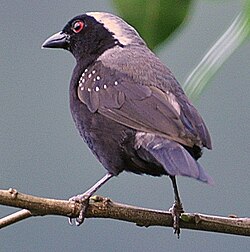| Nigrita | |
|---|---|
 | |
| Grey-headed nigrita (N. canicapillus) | |
| Scientific classification | |
| Kingdom: | Animalia |
| Phylum: | Chordata |
| Class: | Aves |
| Order: | Passeriformes |
| Family: | Estrildidae |
| Genus: | Nigrita Strickland, 1843 |
| Type species | |
| Aethiops canicapillus Strickland, 1841 | |
| Species | |
| |
The nigritas, formerly called negrofinches, are small passerine birds belonging to the genus Nigrita in the estrildid finch family Estrildidae. There are four species which occur across the African tropical rainforest.
Contents
They are 10-15 centimetres long. The bill is short and black and is fairly slender in some species. The colour of the plumage varies but all have a dark tail. The upperparts are grey or brown and the underparts are black, grey, white or reddish brown. The grey-headed nigrita and male pale-fronted nigrita have a black face and the white-breasted nigrita has a black cap. Nigritas have whistling or trilling songs and calls.
They feed on insects, fruit and seeds. They often forage high in the treetops, usually alone or in pairs.

